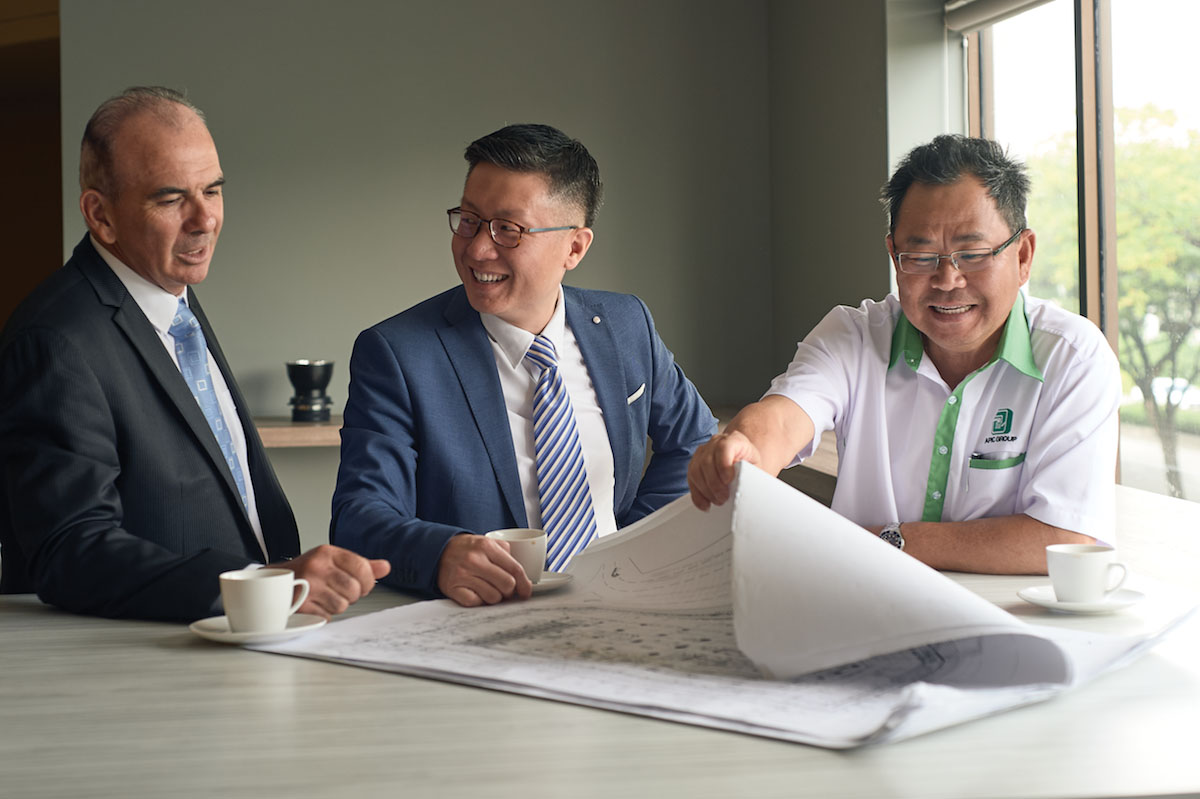Daron Cheah - Master of Business Administration - 2001

Relationships play a big role: Daron Cheah
After spending 18 years working in the consumer goods industry, Daron Cheah made the switch to construction. Now at the helm of plasterboard supplier USG Boral Malaysia, he highlights the differences he found between both industries.
It’s not always about the return on investment in the construction industry, says USG Boral Malaysia Managing Director Daron Cheah – a concept he had to acknowledge when he joined the business. “Being a finance guy, I always talked about ROI,” he tells The CEO Magazine. “But in construction, project references are equally important.
“For example, if I approach a developer who’s building a hotel using traditional construction methods such as brick walls in the rooms, I’d tell them, ‘You’d want to consider drywall because it gives you flexibility, speed and acoustics. Then you’re able to build a hotel, six to 12 months quicker.’ It’s a very good value proposition.
But the question they ask is, have you done it before? What are your project references?” Daron refers to examples such as fitting drywall in buildings for major hotel chains such as Four Seasons or St. Regis. “The project references become a marketing tool that you have to spend time or resources to win and do well in,” he adds.
After 18 years in the consumer goods industry – among heavyweights such as Kellogg’s and Colgate-Palmolive – Daron wanted something fresh. And what better way to try something new than by entering the construction industry?

In 2013, Daron signed on to become CFO of Boral Malaysia, an Australian-based building materials supplier. “I told myself, ‘Why not? It’s a good challenge, I’m still young and I think it’s a fresh start’,” Daron recalls.
A year later he was appointed Managing Director of USG Boral Malaysia, a joint venture between Boral and US-based building products company USG Corporation. USG Boral specialises in plasterboard (drywall) solutions for walls and ceilings and has bases throughout the Asia–Pacific region and the Middle East.
Having come from a consumer industry background, Daron didn’t see much of a difference on the finance side when he joined Boral. “Accounting is accounting, whatever the industry,” he says.
What he did notice, however, was the importance of building relationships in the construction industry. “Relationships play a big role,” he says.
“In the consumer industry, how many of the companies actually know their consumer? They probably have a profile or a demographic, but they don’t know them specifically. In this industry, you have to know them.”
Daron lists the multitude of stakeholders involved in construction, including architects, developers, main contractors, subcontractors and the end buyer – all of whose requirements have to be fulfilled. “It’s a different perspective altogether,” he continues.
“For architects, you may need to provide them with technical solutions and customer service. From a developer’s standpoint, you have to understand who their customer is: the homebuyers. But it’s not only about selling the product to the developers, you have to make sure that your product works for them and their customers."
“Then you come to the main contractor and the subcontractor and they are all talking about how much money they can make. How can we help them make more money while not compromising the quality and speed? They’re all looking for different things altogether – it’s a totally different ball game.”
Daron mentions how USG Boral’s partnerships with suppliers, including Rondo Building Services (its sister company in Australia) and APIC Group, contribute to the company’s success.
He highlights the support of Peter Bradley, General Manager of Rondo in Malaysia. “We share the same shareholders in Australia, so he runs the business in Asia and he provides us with metal solutions.
“When you talk about ceilings and walls, USG Boral only produces the plasterboard, but you need the metal framing inside your wall or on the ceiling to hold onto the board. Rondo provides us with a metal solution which enables us to have a complete system – we call it the wall system or the ceiling system. Otherwise we would just be one of the product providers. So, with the framing system, we can offer a good solution to our customers.”
Over at APIC, Daron mentions the support provided by TO Tan. “TO is one of our very loyal subcontractors. He takes on projects and we support him from a technical standpoint.”

Another major difference between the consumer and construction industries, Daron highlights, is time. “The construction industry is at least two or three generations behind the consumer goods and the telecommunication sectors,” he says.
“For example, you don’t need a robust system to manage it because there is a time difference between the decision and the result. From the day the architects come on board to the day that you should deliver the product is probably a year and a half, on average. But in the consumer industry, whatever you do today, you expect results a week later. If you do a promotion or advertise, you expect better results.”
Modular construction has become a popular trend in Asia’s construction scene, signalling a great opportunity for USG Boral. “It’s a little bit like Lego,” Daron says. “It’s becoming really popular right now and the government is pushing for it. They started with the bathroom pod – what they called a prefabricated bathroom. And now they’re looking at making whole units.”
With modular construction, a unit is built offsite, transported to where it needs to be, hoisted up and finally positioned in its set location.
“Modular construction has become popular because you can run your project in parallel, unlike traditional building where you have to build the foundation, then start building your columns and beams, and then your walls. All this you’ll do floor by floor. Instead, while you do your foundation, you can actually start building a unit. And when your foundation is ready you also have 100 units ready.”
"Modular construction has become popular because you can run your project in parallel."
Daron explains that modular construction cuts down on time and leads to major cost savings. “If a whole building module is going to be built using solid concrete, it’s going to be extremely heavy,” he explains.
“When weight goes in our quotation, it becomes much more expensive because you’ve got to make sure you have the trucks and trailer to transport it. Then there’s the weight limitation on the road, and when you bring it to the site, you need to have more heavy-duty hoisting machines to bring that unit up. If you can bring the weight down, that becomes a cost saving for you.”
And that’s where USG Boral’s drywall solutions fit in. “Drywall is light and with it, your whole unit is ready much quicker. When you start with transportation, moving drywall is going to be much more flexible. We look at it as a big opportunity in Asia for the organisation to grow.”
USG Boral is staying focused on its pursuit to deliver the best building material solutions for its customers in Asia. “I strongly believe that with rising costs, people are looking at efficiencies of building construction, planning and safety,” he says. “And rising costs include labour in particular.
"Developers are looking at alternate solutions and drywall is a proven one."
So, with all these increases, developers are looking at alternate solutions and drywall is a proven one in more mature markets like Australia and the US. Even Korea and Singapore adopted drywall a couple of years back. The opportunity is massive.”
CEO Magazine 25 MARCH 2019 - 11:36 AM
